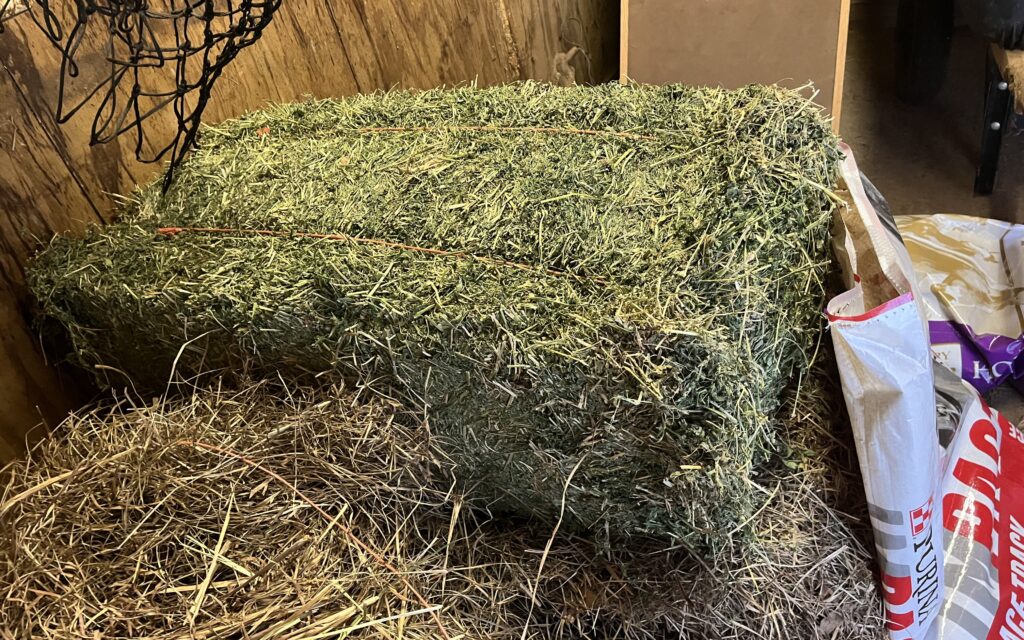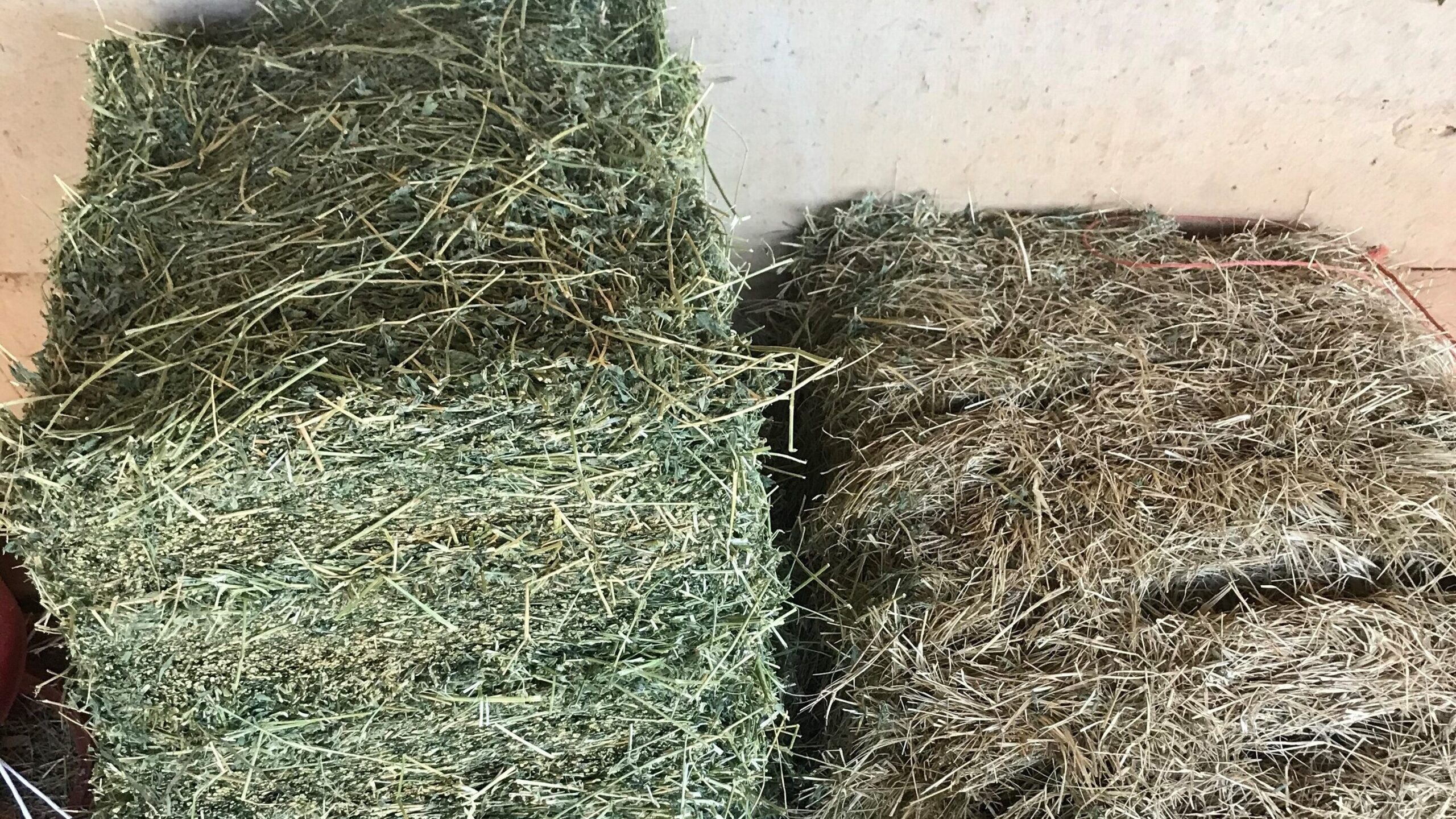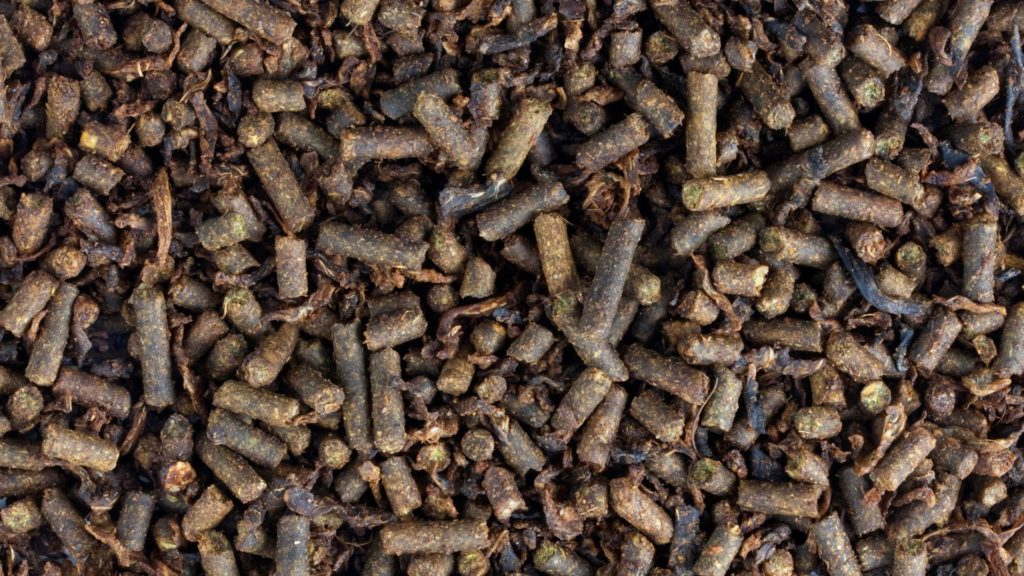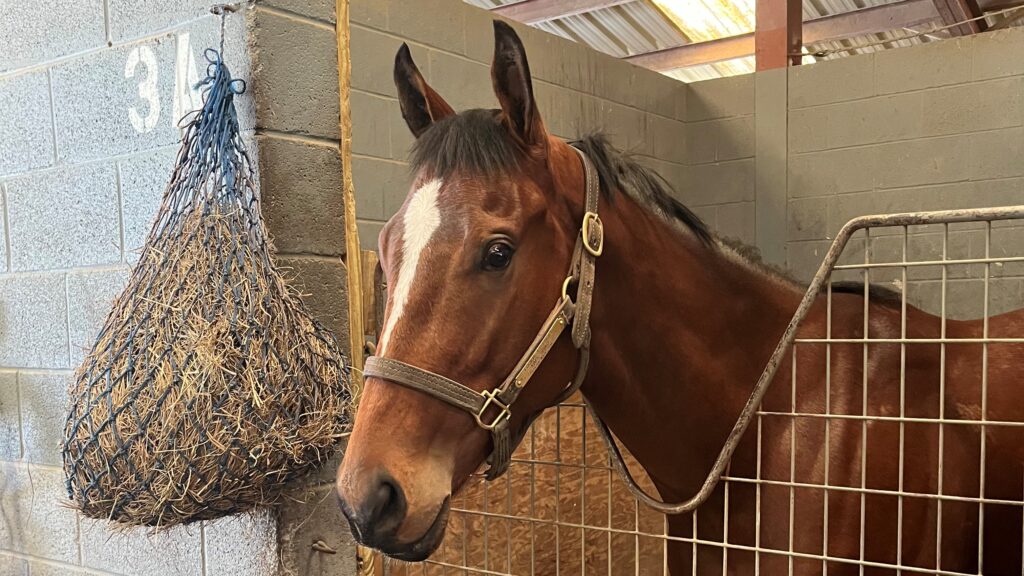Last updated: May 3, 2023
I’ve always been a firm believer in the benefits of feeding my horses alfalfa hay. However, I have friends and fellow horse owners who remain skeptical about whether alfalfa’s benefits justify its higher cost when compared to other hay options.
Alfalfa hay offers numerous benefits for performance horses, including its high protein content for muscle development and recovery. It’s also a great source of fiber that supports digestion, as well as being rich in essential vitamins and minerals for overall health. These advantages make alfalfa a top choice for maintaining athletic potential.
If you’re still on the fence about incorporating alfalfa into your performance horse’s diet, read on for valuable insights. In this blog post, we’ll explore the competitive advantage alfalfa hay provides for performance horses, delving into its nutritional perks, comparisons with alternative feed choices, and useful feeding recommendations.
The Nutritional Advantages of Alfalfa Hay
When it comes to fueling performance horses, I’ve found that the nutritional advantages of alfalfa hay make a significant difference. The key nutritional benefits of alfalfa hay include its high protein content, quality fiber, essential vitamins and minerals, and its role as an ideal energy source for performance horses.

High protein content
When performance horses participate in physically demanding sports, such as racing, showjumping, dressage, or polo, their bodies require additional support. Protein plays a critical role in several aspects of their overall health and performance:
- Muscle development: Protein is made up of amino acids, which are the building blocks of muscles. As horses train and compete, their muscles are constantly growing and adapting to new challenges. Adequate protein intake is essential for proper muscle development, ensuring that performance horses can handle the demands of their sports.
- Muscle maintenance: During intense exercise, muscle fibers can become damaged, leading to fatigue and soreness. Adequate protein in a horse’s diet is essential for muscle repair and maintenance. This helps to minimize the risk of injury and allows horses to recover more quickly between workouts and competitions.
- Energy production: Although carbohydrates and fats are the primary sources of energy for horses, protein can also be utilized as a source of fuel during prolonged exercise. When other energy sources are depleted, the body begins to break down proteins to produce energy, helping to maintain stamina and endurance.
- Immune function: Protein is crucial for maintaining a strong immune system in horses. It helps to produce antibodies and immune cells that protect against infections and diseases. A healthy immune system is particularly important for performance horses, as illness can lead to decreased performance and longer recovery times.
- Body functions: Protein also plays a role in various other bodily functions, such as hormone production, enzyme activity, and tissue repair. All of these processes are important for maintaining overall health and well-being in performance horses.
Feeding my horses alfalfa hay, which is high in protein, ensures that they receive the necessary nutrients to support their athletic demands. By understanding the crucial role protein plays in a performance horse’s health, you can make informed decisions about their diet and help them reach their full potential.
B. Quality of fiber for better digestion
Fiber is a crucial component of a horse’s diet and plays a vital role in maintaining optimal digestive health. The quality of fiber in alfalfa hay can significantly impact a performance horse’s well-being:
- Digestive function: Horses have a unique digestive system designed to break down fibrous plant material. A high-quality fiber source, such as alfalfa hay, supports the natural digestive process by providing the necessary roughage to keep the gastrointestinal tract functioning properly. This helps to prevent digestive issues, such as colic or ulcers, which can be detrimental to a horse’s performance.
- Gut motility: The fiber in alfalfa hay helps to maintain regular gut motility by stimulating the movement of food through the digestive tract. This promotes healthy digestion and prevents issues like impaction or slow transit times, which can lead to discomfort and decreased performance.
- Microbial health: The hindgut of a horse is home to billions of beneficial microbes that aid in the fermentation of fibrous materials. High-quality fiber from alfalfa hay provides an ideal environment for these microbes to thrive, promoting a healthy balance of gut flora and supporting overall digestive health.
- Nutrient absorption: The fiber in alfalfa hay not only aids digestion but also improves nutrient absorption. As the fiber is broken down in the hindgut, it releases essential nutrients that can be absorbed and utilized by the horse. This ensures that performance horses receive the maximum benefit from their diet.
- Weight management: High-quality fiber from alfalfa hay can help with weight management in horses. It provides a sense of fullness, preventing overeating while supplying the necessary nutrients for maintaining optimal body condition. This is particularly important for performance horses, as carrying excess weight can negatively impact their athleticism and stamina.
Feeding horses alfalfa hay, which offers a high-quality source of fiber, supports their digestive health and overall well-being.
C. Rich in vitamins and minerals
Alfalfa hay is packed with essential vitamins and minerals that contribute to a horse’s overall health and performance:
- Calcium and phosphorus: Alfalfa hay is an excellent source of calcium and phosphorus, which are crucial for maintaining strong bones and teeth. A proper balance of these minerals is vital for performance horses, as it helps to prevent bone-related issues and ensures skeletal strength during demanding activities.
- Magnesium: Alfalfa hay contains magnesium, a vital mineral involved in muscle function, nerve transmission, and energy production. Adequate magnesium intake supports muscle recovery, reduces the risk of fatigue, and helps maintain a healthy nervous system in performance horses.
- Potassium and sodium: These essential electrolytes found in alfalfa hay are important for maintaining fluid balance, nerve function, and muscle contractions. Performance horses can lose significant amounts of electrolytes through sweat, so it’s crucial to replenish these minerals to prevent dehydration and muscle cramps.
- Vitamin A: Alfalfa hay is a good source of vitamin A, which supports vision, immune function, and overall growth and development. Sufficient vitamin A intake is important for keeping performance horses in optimal health and ready for competition.
- Vitamin E: This powerful antioxidant found in alfalfa hay helps protect cells from damage caused by free radicals and supports a strong immune system. Vitamin E is also essential for muscle health, helping to reduce inflammation and promote recovery in performance horses.
- B vitamins: Alfalfa hay provides several B vitamins, including thiamine, riboflavin, and niacin. These vitamins play a critical role in energy production, metabolism, and the formation of red blood cells. Adequate B vitamin intake is essential for performance horses to maintain their energy levels during training and competition.
Feeding horses alfalfa hay, which is rich in essential vitamins and minerals, supplies them with the necessary nutrients to support their overall health and performance.
D. Ideal energy source for performance horses
Alfalfa hay is an excellent energy source for performance horses due to its unique nutritional composition and the following benefits:

- High-calorie content: Compared to other types of hay, alfalfa hay has a higher calorie content, making it a more energy-dense option. Performance horses participating in demanding sports require additional calories to fuel their athletic endeavors and maintain optimal body condition. Alfalfa hay helps meet these increased energy needs.
- Balanced energy release: Alfalfa hay provides a combination of readily available energy from non-structural carbohydrates and slow-release energy from its fibrous content. This balance ensures that performance horses have a steady supply of energy throughout their workouts and competitions, preventing sudden drops in energy levels and fatigue.
- Protein as an energy source: Although not the primary source of energy for horses, the high protein content in alfalfa hay can contribute to energy production during prolonged exercise. When other energy sources are depleted, the body can break down proteins to produce energy, helping to maintain stamina and endurance in performance horses.
- Supporting gut health: As previously mentioned, alfalfa hay provides high-quality fiber that supports digestive health. A healthy digestive system is essential for efficient energy utilization and nutrient absorption, ensuring that performance horses have access to the energy they need to excel in their sports.
- Versatility in feeding: Alfalfa hay can be fed in various forms, such as bales, pellets, or cubes, making it an adaptable energy source for different feeding programs. This versatility allows performance horse owners to tailor their horse’s diets to suit their specific energy requirements and preferences.
Comparing Alfalfa Hay to Other Feed Options
As a performance horse owner, the goal is to find the best possible feed options to ensure horses receive optimal nutrition. To find the ideal feed, it’s helpful to compare alfalfa hay to other common options, such as grass hay and grain-based feeds. Here are the pros and cons of each, along with a discussion of the benefits of alfalfa pellets and cubes.
Alfalfa vs. grass hay
When researching feed options for performance horses, it’s common to compare alfalfa hay to grass hay. While grass hay, such as timothy or orchard grass, is a good source of fiber and can contribute to a balanced diet, it typically has lower protein, calorie, and mineral content compared to alfalfa hay. For performance horses that require additional energy and nutrients, alfalfa hay often proves to be the better choice to meet their specific nutritional needs.
Alfalfa vs. grain-based feeds
Another common feed option for performance horses is grain-based feeds, such as oats, corn, or barley, as well as commercial sweet feeds. While these feeds can provide a concentrated source of energy, they often lack the essential fiber and balanced nutrient profile that alfalfa hay offers.
Additionally, sweet feeds typically contain higher levels of sugar and starch, which can lead to an increased risk of metabolic issues in some horses. Feeding large amounts of grain or sweet feed can also result in digestive issues and an increased risk of colic. By incorporating alfalfa hay into a horse’s diet, it is possible to provide them with a more balanced source of energy, protein, and essential nutrients while promoting better digestive health.

Understanding the benefits of alfalfa pellets and cubes
In addition to traditional baled alfalfa hay, I’ve also explored the benefits of alfalfa pellets and cubes. These products are made from ground alfalfa hay, which is then compressed into easy-to-feed forms.
They offer many of the same nutritional advantages as baled alfalfa hay, with a few added benefits. Pellets and cubes are less prone to mold and dust, making them a suitable option for horses with respiratory issues.
They also take up less storage space and can be more convenient to handle and transport. By considering the unique advantages of each alfalfa hay form, I can tailor my horses’ feeding program to their specific needs and preferences.
Feeding Guidelines for Performance Horses
Finding the right balance in a performance horse’s diet is essential. Determining the appropriate amount of alfalfa hay to feed depends on several factors, such as the horse’s size, age, activity level, and specific sport requirements.
A general guideline is to provide 1.5-2% of the horse’s body weight in forage, with a portion of that being alfalfa hay. It’s crucial to monitor your horse’s body condition and adjust the feed amounts accordingly to maintain optimal health and performance.
Feeding frequency and timing for optimal performance
The feeding frequency and timing can significantly impact a performance horse’s energy levels and overall well-being. I’ve found that it’s best to feed my horses multiple smaller meals throughout the day, mimicking their natural grazing behavior.
This approach helps maintain a steady supply of energy and prevents digestive issues associated with large meals. When it comes to performance events, it’s essential to allow enough time for digestion before exercising, ideally feeding alfalfa hay 3-4 hours before the event.
Balancing alfalfa hay with other feed components
While alfalfa hay is an excellent source of energy, protein, and essential nutrients for performance horses, it’s important to balance it with other feed components. This may include grass hay, grains, or commercial feeds, as well as supplements to meet specific nutritional needs.
By carefully evaluating and adjusting the various elements in my horses’ diets, I can ensure they receive a well-rounded and balanced diet tailored to their unique requirements.
Adjusting the diet for individual horse’s needs and sport requirements
Every performance horse is different, and their nutritional needs can vary based on factors such as breed, age, workload, and the specific sport they participate in. As a responsible horse owner, I constantly assess and adjust my horses’ diets to meet their individual needs and sport requirements.
This may involve consulting with an equine nutritionist or veterinarian to develop a customized feeding plan that optimizes my horses’ performance while maintaining their overall health and well-being. For example, one of my horses has to eat beet pulp in combination with alfalfa to maintain his weight.

Tips for Introducing Alfalfa Hay to Your Horse’s Diet
When first incorporating alfalfa hay into a performance horse’s diet, it’s essential to understand the importance of a gradual introduction. Making a sudden change in a horse’s diet can lead to digestive issues, such as colic or loose stools.
To avoid these problems, it is recommended to gradually increase the amount of alfalfa hay over a period of 7-10 days, while simultaneously decreasing their current forage. This slow transition allows the horse’s digestive system to adjust to the new feed, minimizing the risk of complications.
As you introduce alfalfa hay to your horse’s diet, it’s crucial to closely monitor their reaction. Keep an eye on their overall health, body condition, energy levels, and performance. Some horses may experience weight gain or show signs of sensitivity to the richer feed.
As with any dietary change, it’s essential to be flexible and willing to make adjustments based on your horse’s needs. If you notice any adverse reactions or if your horse’s performance doesn’t improve as expected, consider adjusting the amount of alfalfa hay or balancing it with other feed components.
You may also want to consult with an equine nutritionist or veterinarian to help fine-tune your horse’s diet for optimal health and performance. Stay attentive to your horse’s needs and make necessary adjustments, and you’ll reap the benefits of alfalfa hay while maintaining your horse’s overall well-being.
Potential Concerns and How to Mitigate Them
While alfalfa hay offers numerous benefits for performance horses, it’s important to be aware of potential concerns, such as the risk of weight gain. Due to its high-calorie content, feeding too much alfalfa hay can lead to excessive weight gain in some horses.
To manage this risk, I closely monitor my horses’ body condition and adjust their feed amounts accordingly. If weight gain becomes an issue, consider reducing the amount of alfalfa hay and balancing it with lower-calorie forage options like grass hay to maintain an ideal body condition.
Preventing nutrient imbalances
Alfalfa hay is rich in nutrients, but it’s essential to ensure that your horse receives a balanced diet to prevent nutrient imbalances. When incorporating alfalfa hay into my horses’ diets, I carefully evaluate their overall nutritional intake, considering other feed components and supplements.
In some cases, it might be necessary to consult with an equine nutritionist or veterinarian to develop a comprehensive feeding plan that ensures your horse receives all the necessary nutrients in the correct proportions.
Ensuring the quality of alfalfa hay
The quality of alfalfa hay can significantly impact your horse’s health and performance. When sourcing alfalfa hay for my horses, always check for factors such as color, smell, and texture to ensure it’s fresh and free from mold or dust.
Storing alfalfa hay properly is also crucial to maintain its quality and prevent spoilage. It is best to keep it in a cool, dry, and well-ventilated area, away from direct sunlight and moisture. Be diligent in selecting and storing alfalfa hay to ensure your horse receives the highest-quality feed that supports their performance and well-being.
Conclusion
Alfalfa hay has proven to be a game-changer for many performance horses across various disciplines. Its rich nutritional profile, including high protein content, quality fiber, essential vitamins, and minerals, makes it an ideal feed choice for supporting optimal performance and overall health.
By understanding the benefits of alfalfa hay and following appropriate feeding guidelines, you can give your horse the winning edge they need to excel in their sport. Remember to always monitor your horse’s condition and adjust their diet as needed to ensure they continue to thrive. Alfalfa hay can be a valuable addition to your performance horse’s diet, helping them reach their full potential.

About the Author: Miles Henry
Lifelong Horseman | Racehorse Owner | Published Author
Miles Henry brings over 25 years of hands-on experience training and owning Thoroughbred racehorses. Raised with Quarter Horses and Appaloosas, he’s spent a lifetime learning from horses—on the track, in the barn, and in the field. Today, he runs a small but successful racing stable in Louisiana and shares real-world insights on HorseRacingSense.com, helping horse owners, fans, and bettors navigate the sport with confidence.
📚 Books: View Miles’s books on Amazon »
🎧 Podcast Guest: Animal Tales Ep. 32 |
YouTube Interview
📩 Newsletter: Sign up for racing tips and horse care advice »
🔗 Follow Miles:
Twitter |
Facebook |
YouTube

